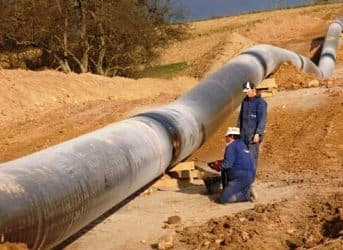The refining director at BP caused a stir last week in Berlin when he was interpreted as saying the full version of the Nabucco natural gas pipeline was no longer an option for the consortium working in the Shah Deniz natural gas field in Azerbaijan. Wire services had reported that his statements meant Nabucco was effectively dead despite years of political maneuvering. Not so, said the European Commission, and several other players involved in the 2,149-mile project. It makes sexy headlines to sink a $10 billion ship, but there are plenty of reserves to keep Nabucco at least on standby.
By mid-May, proposals for Nabucco West, a smaller version of the original proposal, and the South East Europe Pipeline were sitting on the desk of BP's offices in Azerbaijan. By next month, the BP-led consortium managing the second phase of the Shah Deniz natural gas field in the Caspian Sea is expected to pick one of them.
Last week, Iain Conn, chief executive officer for refining and marketing at BP, told an audience at an energy forum in Berlin that his company was examining several options to transport an estimated 10 billion cubic meters of natural gas per year to European markets. This would come from Shah Deniz 2 by 2017 to the tune of $40 billion. This natural gas designation means the so-called Southern Corridor, a network of natural gas transit projects, must be built to accommodate that volume. Any network within that corridor, he said, "must" be considered on its basis for future expansion.
The partners involved at Shah Deniz have already selected the Trans-Adriatic Pipeline for the southern route to Italy. This, he said, meant the planned Interconnector Turkey-Greece-Italy project was off the table and had "no possibility" to move forward. For markets in southeastern and central Europe, Conn said the group was examining SEEP and Nabucco West. Both had submitted their proposals to the BP-led consortium in Baku by mid-May and a decision is expected soon. SEEP, he said, was backed by Shah Deniz partners in coordination with the Bulgarian, Hungarian and Romanian governments. It meets the expansion requirement, he said, because it could be scaled up as more natural gas becomes available. Nabucco West, meanwhile, was submitted by the Nabucco international consortium based on work carried out for the original pipeline planned form the Georgia to European markets.
Does that mean Nabucco "Classic" is dead? According to some, it does. Most pipeline wonks already consider the greater Nabucco to be a thing of the past. In 2009, when Turkey, along with Romania, Bulgaria, Hungary and Austria, signed an intergovernmental agreement to build the entire pipeline, Ankara hailed it as a "historic moment." But even then, most analysts were concerned about where the gas would come from for the pipeline. So far, Iraq, Azerbaijan and a variety of others are listed as possible suppliers for the full-scale project.
Alexandros Petersen, an adviser with the European Energy Security Initiative at the Woodrow Wilson International Center for Scholars, told me that whatever happens, it's important to keep interest going for all of the projects involved in the Southern Corridor.
"It won't be over once one pipeline is built," he said.
Rumors of Nabucco's demise are somewhat exaggerated. It's not necessarily dead, just in hibernation.
ADVERTISEMENT
By. Daniel Graeber of Oilprice.com



















Whatever version of Nabucco is eventuaaly given the go ahead as a southern supply route 'away from Russian influence', this will be seen to be a myth.
Nabucco in any guise will start at the Caspian, at Azerbaijan. Classic Nabucco was designed to go through Georgia, a stones throw from Russian military bases in the breakaway regions of that country. Other versions may go from Azerbaijan directly south through Turkey.
Azerrbaijan is caught between Russia, Iran and Turkey. It is Turkish speaking but has much Iranian influence (about a third of Iran is made of Azerbaijani related peoples). Russia has a radar station and much political clout in Azerbaiojan due to military presene in Armenia (related to Nagorno-Karabakh) and N.Georgia.
Nabucco would be prey to upheavals emanating from all these influences. Not a very good insurance risk...
If the Eurasian Union were to come about, which under Putin is more than likely, such a development would make disruption to Nabucco evn more likely.
The West would do better to give up the mirage of a Caspian supply route independant of Moscow. It ain't going to happen.